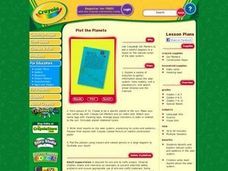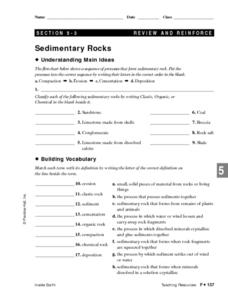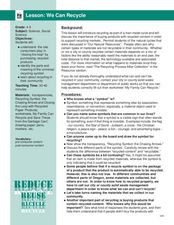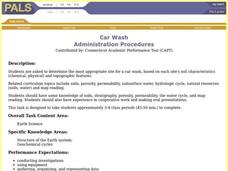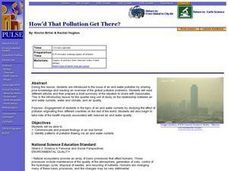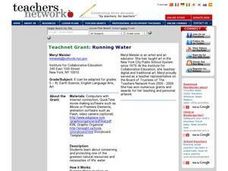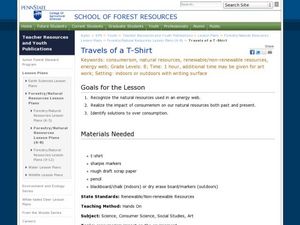Curated OER
The Rain Maker
Second graders work in small groups with a cup each of several materials. Students layer the gravel, sand, and water into a resealable bag. They draw a picture of this bag in their water journal. Students place their sealed bags in a...
Curated OER
Plot the Planets
Students identify and explain natural cycles and patterns in the solar system. They write short reports about the solar system. Students plot the order of the planets in a colorful diagram. They use Crayola Gel Markers to add a colorful...
Laboratory for Atmospheric and Space Physics
Polar Vortex Interactive
An interactive lesson places pupils as scientists who must learn why the ozone layer is being destroyed by analyzing the data from multiple satellites. The first analysis shows how UV is related to the ozone cycle. The second...
University of Minnesota
Manduca sexta: Caterpillar Dissection
Caterpillars have an amazing, yet tough job to perform in their short lives — eat much, avoid predators, and try not to let all those comments about being the unattractive stage of the life cycle get to them. How do they handle it all?...
Curated OER
Selecting Soil Organisms in Compost
Students conduct an experiment to demonstrate that many of the enzyme systems needed to break down society's wastes exist in nature among the decomposers in a compost pile. They culture compost bacteria on starch agar to examine the...
Curated OER
Selecting Soil Organisms in Compost
Learners demonstrate that many of the enzyme systems needed to break down--and therefore clean up-society's wastes already exist in nature among the decomposers. They select the best starch-munching organisms by altering the environment...
Curated OER
Ions in the Environment
Students explain the importance of the five main biogeochemical cycles. In this chemistry lesson, students discuss how ions are transported in the environment. They design an experiment to collect data on eutrophication.
Curated OER
How Much Carbon is Held by the World's Forests?
Seventh graders identify how much carbon is held by the world's forests. For this forestry lesson, 7th graders study the carbon cycle and discuss what role humans have had on climate change. Students write a one page paper on how...
Curated OER
The World of Insects and Spiders
Students identify numerous insects and their body parts. In this insect life lesson, students practice using scientific vocabulary while comparing the different parts of spiders and insects. Students view several videos...
Curated OER
Sedimentary Rocks
Second graders receive an introduction to the rock cycle. They dicuss the geologic rock cycle. They create a simulation of a sedementary rock.
Curated OER
Animal Homes
Students explore how an animal's relationship to its habitat affect the animal's survival. They discuss animal habitats and the animal's relationship to that habitat through the food chain, life cycle, community, and balance of nature....
Curated OER
Our Space Station Earth
Students discover ways to preserve the Earth's resources. In this natural resources lesson plan, students investigate how many gallons of water the average American uses per day and then total their estimated usage. Students discuss...
Curated OER
Animals
Second graders define and describe the characteristics of a mammal and a mammal's importance to man. They also describe the life cycle of a frog and compare and contrast a larva and an adult frog. Finally, 2nd graders study and explain...
Curated OER
Food: Early American Food Cycles Web Quest
Students complete a Web Quest on ways that Native Americans hunted for, harvested, stored, and prepared food and what types of natural foods were eaten. In this early American food cycles lesson, students discover many of the ways...
Curated OER
We Can Recycle
Students analyze the symbol for recycling. In this recycling lesson, students define and identify various symbols and draw the symbol for recycling. Students investigate ways to keep natural resources in the recycling loop.
Curated OER
Exploring Ecology
Students explore the basics of ecology. They discuss ecological succession, the water cycle and human impacts on the environment. Students explore the owls, succession, the human impact on the environment and complete the "Incredible...
Curated OER
Water
For this water worksheet, students read an excerpt about the effects of pollution on the life cycle of a lake. Then they describe how lakes are affected by the pollution. Students also define why pollution has become such a problem for...
Curated OER
The Seasonal Cycle
Students complete a unit of lessons on the four seasons. They examine the effect each season has on plants, animals, and people during the actual season, read magazine and newspaper articles, and create a calendar and poster about each...
Curated OER
Car Wash
Students determine the most appropriate site for a car wash, based on each site's soil characteristics (chemical, physical) and topographic features. They perform an experiment to determine the changes to three different soil types when...
Curated OER
Environment: How'd That Pollution Get There?
Students examine how global wind and water patterns aid in the spread of worldwide pollution. In groups, they read articles about the domino effect of pollution and create posters displaying its journey. On blank world maps, students...
Curated OER
Exploring the Night Sky: Fall/Winter
Students explain how moon phases occur. They explain three ways that the night sky has been used through history. Students locate some of the constellations in the night sky. They discuss stories and myths surrounding stars.
Curated OER
Running Water
Sixth graders create products that feature the importance of water conservation. For this environmental stewardship lesson, 6th graders explore the water cycle and conduct on water usage. Students also research water pollution and...
Curated OER
The Magic School Bus Wet All Over Clean-up!
Young scholars investigate the water cycle using activities from The Magic School Bus series. They determine what happens when water is heated and cooled by observing two different experimental set-ups.
Curated OER
Travels of a T-Shirt
Eighth graders recognize the natural resources used in an energy web. In this consumerism lesson students identify solutions to over consumption and the impact of consumerism.
Other popular searches
- Cycles in Nature Powerpoint
- Life Cycles in Nature
- Different Cycles in Nature
- Search Cycles in Nature
- Cycles in Nature Lab
- Cycles in Nature Maze



